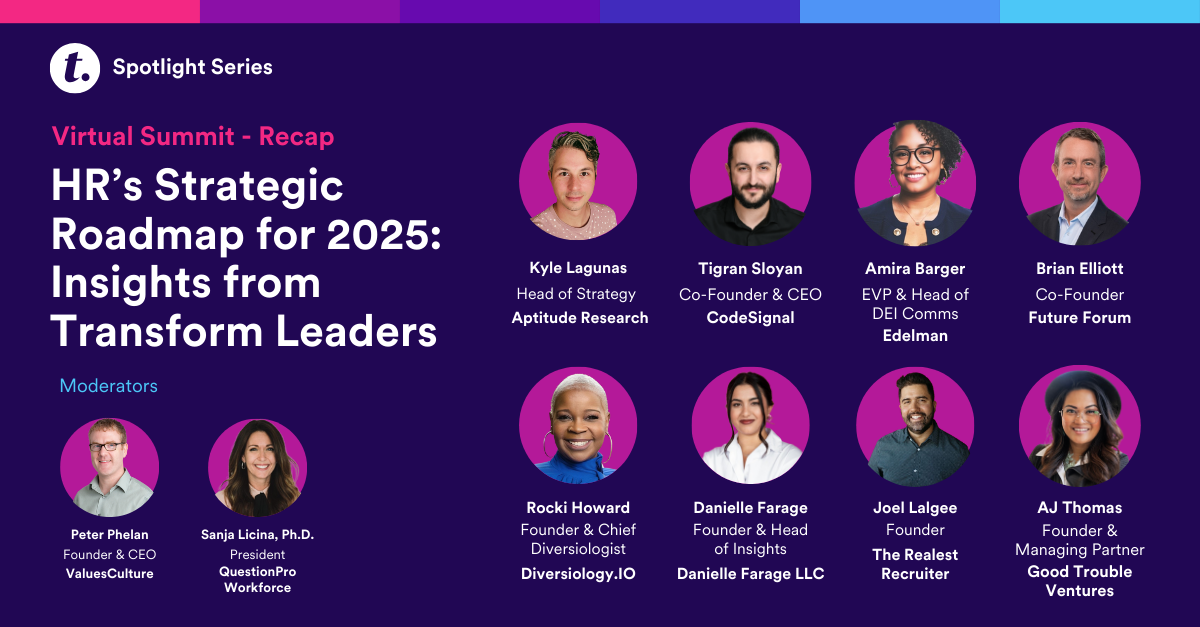
The countdown to Transform 2025 officially began with an inspiring virtual summit, HR’s Strategic Roadmap for 2025: Lessons and Insights from Transform Leaders, featuring some of the brightest minds in the HR space including. Over the course of two panels, these people-centric leaders shared their perspectives on how HR can navigate the convergence of AI, people-first leadership, and inclusivity to build thriving organizations. The event set the stage for bold thinking and actionable strategies as we prepare for the challenges and opportunities of the year ahead.
Panel 1: The Big Picture – Strategic Outlook for 2025
Moderator: Sanja Licina, Ph.D.
Speakers: Kyle Lagunas, Tigran Sloyan, Amira Barger, Brian Elliott
The first panel opened with moderator Sanja Licina, Ph.D., President at QuestionPro Workforce, setting the stage by highlighting how AI and human potential intersect to create transformative opportunities for HR. She welcomed the panelists, each with a unique perspective on how organizations can adapt to the rapidly evolving workplace landscape.
Kyle Lagunas, Head of Strategy at Aptitude Research, emphasized the importance of HR taking an active role in AI governance. “The table HR needs to be sitting at is the AI table,” he stated. Lagunas underscored the need for HR leaders to develop AI literacy, enabling them to advocate for ethical and human-centered applications of AI in the workplace.
Tigran Sloyan, Co-Founder and CEO of CodeSignal, built on this idea, pointing out that skills-based hiring is becoming critical in an AI-driven world. “We need to prioritize skills-based resumes over traditional markers like education and past roles,” he said. Sloyan highlighted how AI can help organizations identify and nurture emerging talent based on real capabilities, not just credentials.
Amira Barger, EVP and Head of DEI Communications at Edelman, shifted the conversation to diversity, equity, and inclusion (DEI). She stressed the need for organizations to go beyond metrics. “DEI can’t just be about metrics. It’s about embedding equity into leadership behaviors and decision-making processes,” Barger explained. She called for systemic change to ensure equity is woven into the fabric of organizational culture.
Brian Elliott, Co-Founder at Future Forum, wrapped up the discussion by emphasizing the role of technology in enhancing, rather than replacing, human connection. “Technology is just the tool—it’s how we use it to enhance people’s experiences that truly matters,” Elliott said. He shared examples of organizations successfully blending flexibility and innovation to create more meaningful work experiences.
Key Takeaways from Panel 1:
- HR leaders must become literate in AI to ensure ethical and effective applications in the workplace.
- Skills-based hiring will be essential to adapt to the changing demands of work.
- DEI efforts should focus on systemic equity, not just surface-level metrics.
- Technology should amplify human connection, not replace it.
Panel 2: Practical Tactics – Actionable Steps for Today
Moderator: Peter Phelan
Speakers: Rocki Howard, Danielle Farage, Joel Lalgee, AJ Thomas
The second panel shifted the focus to practical, actionable steps that organizations can implement now. Moderator Peter Phelan, Founder and CEO at ValuesCulture, set the tone by emphasizing the importance of aligning strategies with both technological advancements and human needs.
AJ Thomas, Founder and Managing Partner at Good Troubles Ventures, started the discussion by addressing flexibility in the workplace. “Flexibility isn’t a perk anymore—it’s the bare minimum for attracting and retaining top talent,” she said. Thomas highlighted how organizations that prioritize flexibility are better positioned to compete for the best talent.
Danielle Farage, Founder and Head of Insights at Danielle Farage LLC, brought a generational perspective, discussing how Gen Z is influencing workplace culture. “Gen Z expects purpose, inclusion, and authenticity and they aren’t afraid to push for it,” she explained. Farage advocated for involving younger employees in co-creating workplace solutions to build trust and engagement.
Joel Lalgee, Founder at The Realest Recruiter, talked about the importance of employer branding, emphasizing transparency and authenticity. “Your employer brand isn’t what you say it is—it’s what your employees say it is,” he noted. Lalgee shared examples of how companies can build stronger connections with current and potential employees through honest storytelling.
Rocki Howard, Founder and Chief Diversiologist at Diversiology.io closed the session by discussing inclusion as a strategic imperative. “Inclusion isn’t a buzzword; it’s a business strategy that drives innovation and loyalty,” she stated. Howard shared practical advice on embedding inclusivity into every stage of the talent management lifecycle.
Key Takeaways from Panel 2:
- Flexibility is now a baseline expectation for talent attraction and retention.
- Gen Z’s emphasis on purpose and inclusion is reshaping workplace culture.
- Authentic employer branding is critical to building trust and loyalty.
- Inclusion should be treated as a strategic business priority.
Wrap Up:
The path to 2025 is clear: HR leaders must embrace change, prioritize people, and balance innovation with empathy. The insights shared during the virtual summit illustrate that the future of work is not only about leveraging technology but also about fostering trust, inclusion, and human connection. As we look ahead to Transform 2025 on March 17-19, the themes from this summit will continue to shape the dialogue on how we can lead with purpose and vision.
Meet all of these top people-first leaders and join us in engaging conversations and community as we transform the now and next of work together at Transform 2025. Join us!
